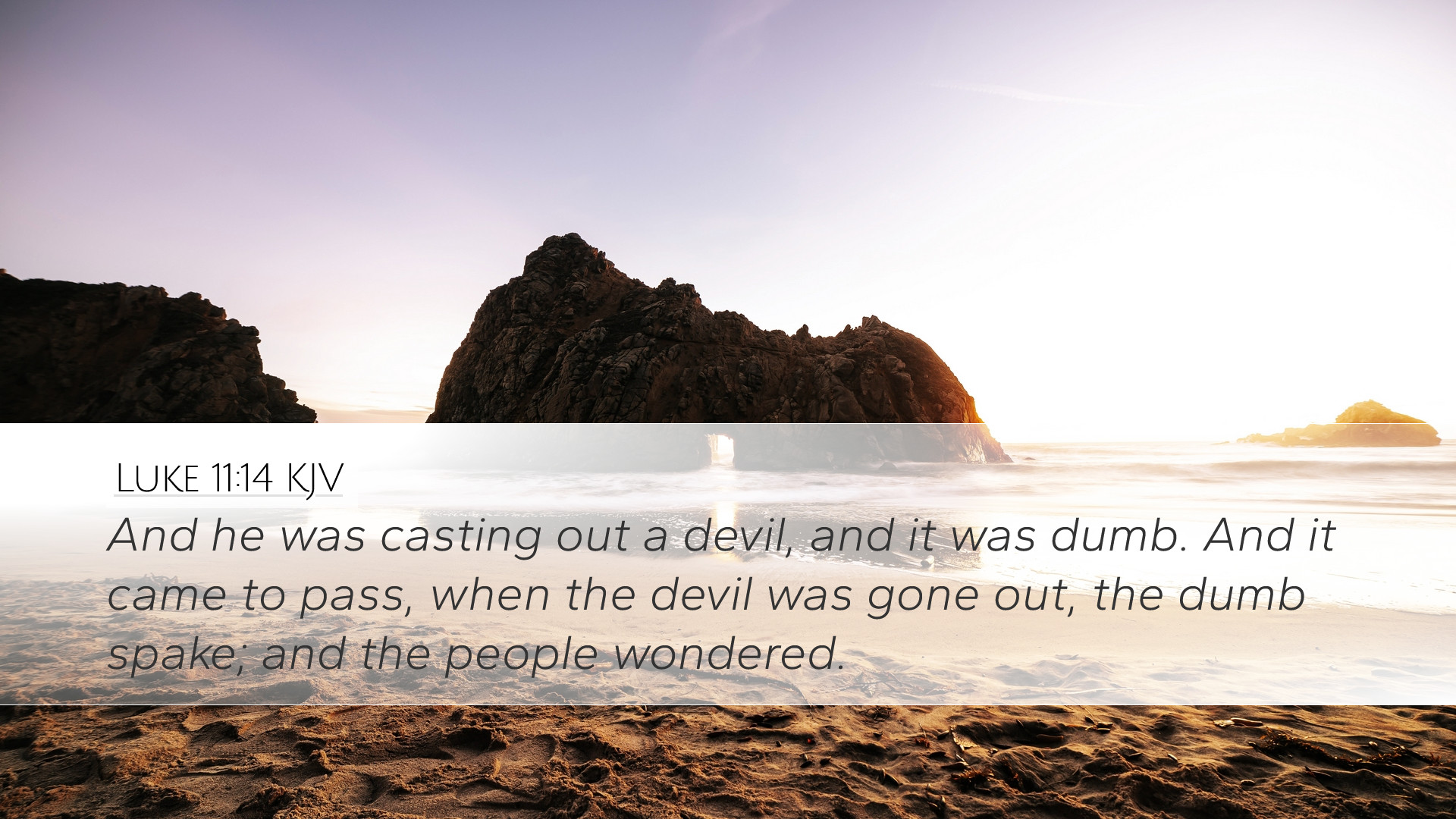Commentary on Luke 11:14
Text of the Verse: "And he was casting out a devil, and it was dumb. And it came to pass, when the devil was gone out, the dumb spake; and the people wondered."
This verse is a significant moment in the ministry of Jesus, encapsulating His authority over demonic powers and His ability to perform miracles that testify to His divine nature. This commentary seeks to analyze and synthesize insights from prominent public domain commentaries, providing a comprehensive view that can benefit pastors, theologians, and students alike.
Contextual Analysis
The surrounding context of Luke 11 highlights the growing opposition to Jesus during His ministry. The act of casting out devils was among the signs of the kingdom of God breaking into the world. In chapter 11, Jesus had been teaching His disciples about prayer and the need for spiritual vigilance, thus preparing them for the confrontation with evil spirits.
Exegesis and Interpretation
-
Authority Over Evil (Matthew Henry)
Matthew Henry emphasizes the authority of Jesus in casting out demons, which serves as a demonstration of His divine power. The fact that the possessed individual was mute signifies the severity of his condition, implying that demons can exert considerable control over the physical and spiritual lives of individuals. Henry suggests that Jesus' intervention is not only a physical healing but also a restoration of voice and testimony, which is a critical element in His ministry.
-
Response of the People (Albert Barnes)
Albert Barnes notes the astonishment of the crowd following the miracle. The act of casting out the devil and restoring speech to the mute man elicited wonder from the people, which reveals the miraculous nature of Jesus' works. This wonder becomes both a means of encountering the divine and a response to the presence of God's kingdom. Barnes posits that this response can be a model for how believers should react to God's miracles and grace in their lives today.
-
The Nature of Spiritual Warfare (Adam Clarke)
Adam Clarke takes a deeper look into the nature of the spiritual warfare depicted in this verse. He argues that the act of casting out the devil signifies a broader spiritual battle between the forces of good and evil. Clarke notes that the strategy of the enemy is to steal, kill, and destroy, whereas Jesus comes to give life and restoration. The healing of the dumb man serves as a token of the advance of Christ’s kingdom against the strongholds of the enemy.
-
Meaning of 'Dumb' (Theological Significance)
In biblical terms, the inability to speak often represents a lack of testimony or praise. By freeing the man from demonic oppression, Jesus restores not only his voice but also the ability to testify about God's goodness. This restoration aligns with the broader biblical theme of redemption, where Jesus transforms lives, giving individuals a voice to proclaim His glory.
Theological Implications
Luke 11:14 illustrates several theological themes relevant to modern believers:
-
Christ’s Power:
This verse affirms the power of Jesus over supernatural forces. It distinguishes Him as the Son of God with authority that transcends earthly limitations. Pastors and theologians can derive comfort from the fact that Jesus is still in control over all spiritual matters today.
-
The Inbreaking of God’s Kingdom:
The miracle illustrates the arrival of God’s kingdom, promising freedom from the bondage of sin and demonic oppression. It challenges believers to embrace the transformative power of Christ in their lives.
-
The Role of the Church:
As agents of Christ's mission, the Church is called to confront evil and bring healing to a broken world. This action invites reflection on how the modern Church engages in spiritual warfare and addresses issues of demonic influence.
Practical Applications
For pastors and church leaders, this text serves as a reminder of the importance of prayer and reliance on the Holy Spirit in ministry contexts where spiritual oppression is evident. It also invites theological reflection on how to effectively minister to individuals bound by sin or demonic influence.
- Prayer and Deliverance: Encourage congregations to engage in fervent prayer for those struggling with spiritual oppression.
- Teaching on Spiritual Warfare: Equip the church with teaching about the reality of spiritual warfare and Christ’s ultimate victory over evil.
- Community Support: Foster a supportive community that encourages healing and deliverance through Christ.
Conclusion
Luke 11:14, in its brevity, encapsulates profound truths about Jesus’ authority and the nature of His mission. The combination of exegesis and theological reflection from public domain commentaries enriches our understanding and invites deeper engagement with the text. This passage is a powerful reminder that in Christ, there is authority, hope, and restoration. It speaks not only to the people of Jesus' time but also challenges believers today to recognize the work of Christ in delivering and transforming lives.


